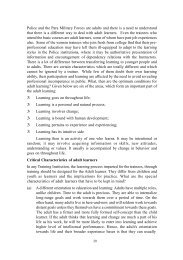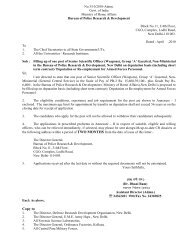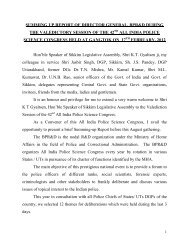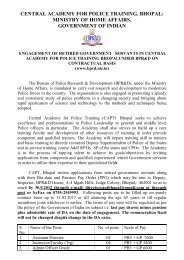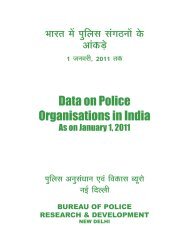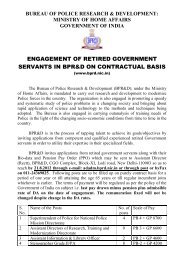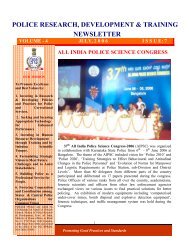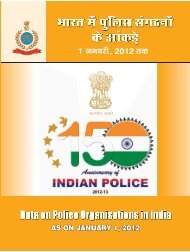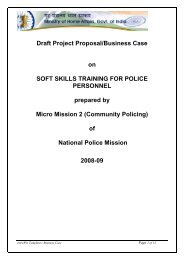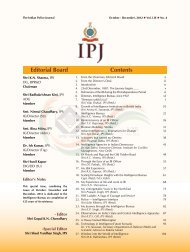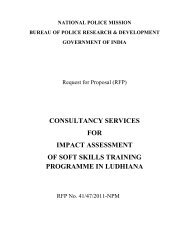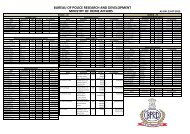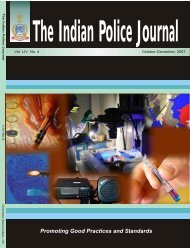April - June 2010 - Bureau of Police Research and Development
April - June 2010 - Bureau of Police Research and Development
April - June 2010 - Bureau of Police Research and Development
- No tags were found...
Create successful ePaper yourself
Turn your PDF publications into a flip-book with our unique Google optimized e-Paper software.
The estimated loss inMumbai alone fromterror toll <strong>of</strong> the 60hour ordeal is peggedat Rs. 4,000 cr.Additionally the closedstock exchange,national stockexchange <strong>and</strong>commodity exchangesmarkets halted tradingworth Rs. 32710 cr !.While US earmarksabout 20 percent <strong>of</strong> thefederal budget, thebudgetary expenditurein India on police aspercentage <strong>of</strong> GDP ishardly 0.55 percent.Budgetary Allocation for Prevention <strong>of</strong> CrimeA Flawed Model for <strong>Development</strong>Maharashtra has 143 policemen per lakh <strong>of</strong>population as compared to 200-250 in advancedcountries <strong>and</strong> the UN norm <strong>of</strong> 222. As per theestimates <strong>of</strong> National Crime Records <strong>Bureau</strong> (2007)vacant posts in the armed police constitute13.8 percent <strong>and</strong> that <strong>of</strong> civil police correspondsto 9.8 percent.Estimated Loss <strong>of</strong> 26/11 AttacksThe economic impact <strong>of</strong> terrorism can be calculatedfrom a variety <strong>of</strong> perspectives. There are direct coststo property <strong>and</strong> immediate effects on productivity,as well as longer term indirect costs <strong>of</strong> counteringterrorism. The human cost in terms <strong>of</strong> lives lost is,<strong>of</strong> course, incalculable. According to Krugman(2004) the direct cost <strong>of</strong> the September 11 attackson USA has been estimated at over $20 billion.The estimated loss in Mumbai alone from terrortoll due to the 60 hour ordeal the country's financialcapital is pegged at Rs. 4000 cr. Additionally theclosed stock exchange, national stock exchange<strong>and</strong> commodity exchanges markets halted tradingworth Rs. 32,710 cr. ! It also resettled into shrinkageon the number <strong>of</strong> daily commercial operations asmany corporate <strong>of</strong>ficers suspended normaltransaction. The attacks on Mumbai disturbed thetelevision <strong>and</strong> film industry, with an estimated lossabout Rs. 10 cr. during the four days <strong>of</strong> terror. Yetanother group come under city markets,entertainment <strong>and</strong> shopping malls where hardly anybusiness is transacted, though the attack mainlyfocused on two luxury hotels <strong>and</strong> other placesfrequented by Westerners (Business Line, 2008).Currently tourism contributes an estimated Rs. 905billion or 5.6 percent to the GDP <strong>of</strong> India comparedto the world average <strong>of</strong> 10 percent. The travel <strong>and</strong>tourism sector created 9.3 million jobs directly <strong>and</strong>17.4 million indirectly in 1999. This was expectedto increase to 12.9 million jobs directly <strong>and</strong> 25million indirectly by <strong>2010</strong> (GOM, 2003). Mumbaiis the capital <strong>of</strong> Maharashtra <strong>and</strong> the commercial<strong>and</strong> entertainment hub <strong>of</strong> India <strong>and</strong> it tops as a majortourist destination also. The killing <strong>of</strong> foreign touristsdeterred to infer tourism in the near future. Mumbaiterror strikes take a toll on Goa tourism sector asindicative <strong>of</strong> the cancellations which hotels <strong>and</strong> touroperators received. India's air travel industry, alreadyhit by slowdown due to the global financial crisis,is faced with another set back after a series <strong>of</strong> terrorattacks in the country's financial hub killed so manyin the midst <strong>of</strong> the peak tourist season. Theeconomic slowdown had caused 30 percent dropin tourist arrivals this winter <strong>and</strong> industry expertsfear the drop in traffic could go up to 40 percentthe largest ever witnessed in the last 6-7 years(Business Line, 2008).Industries hardest hit by lost job include restaurants,retail trade, hotel, building services <strong>and</strong> apparelmanufacturing. Business activity has fallen in anumber <strong>of</strong> industries where as the impact isprimarily by working few hours <strong>and</strong> being paidcommensurately less. The economic devastationwhen national <strong>and</strong> local economies are in recessionis likely to affect many related industrial activities.Rectification <strong>of</strong> Flawed ModelRadical measures are needed <strong>and</strong> they should bemodified so that police reforms are accelerated asthey are crucial for the establishment <strong>of</strong> the rule <strong>of</strong>law, that has been given low priority by successivegovernments at the centre <strong>and</strong> the states,irrespective <strong>of</strong> the party affiliations. Mere additionto numbers has to give way to making the policemore efficient, productive <strong>and</strong> effective by provision<strong>of</strong> modern aid, equipment for enhanced mobility <strong>and</strong>sophisticated communications.Insinuations from politicians- such as the unjustcriticisms from BJP <strong>of</strong> Hemant Karkare <strong>of</strong> his rolein the investigations <strong>of</strong> the Malegaon blasts,punitary appointments <strong>and</strong> political transfers asmentioned by Reberio have demoralized the policeforce. Independence <strong>and</strong> freedom in their sphere<strong>of</strong> work are quintessential for the police to keep thecity safe. Infighting <strong>and</strong> red tape in the procurement<strong>of</strong> life-saving quality items such as bullet pro<strong>of</strong>jackets <strong>and</strong> armoured vehicles have also stressedour 'protectors'. In this regards the civil society hasto come ahead <strong>and</strong> protest, <strong>and</strong> be supportive totheir brethren in police force. A myopic view or shortpublic memory to terrorist incidents also needs to60 ➢ The Indian <strong>Police</strong> Journal Vol. LVII-No. 2, <strong>April</strong>-<strong>June</strong>, <strong>2010</strong>



